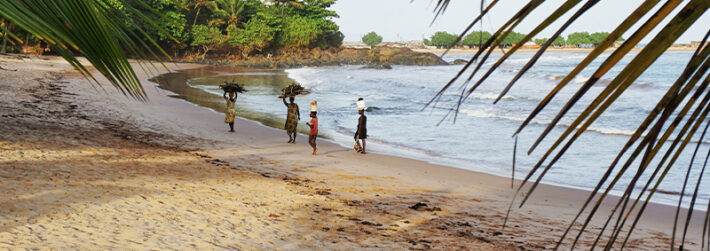Welcoming the ocean report of the UN Special Rapporteur on the human right to a healthy environment

The UN Special Rapporteur on the human right to a clean, healthy and sustainable environment, Astrid Puentes Riaño, issued a report on the ocean and human rights (A/HRC/58/59), which confirms many of the One Ocean Hub research findings. The report addresses the importance of a holistic, comprehensive, integrated, gender-responsive and human rights- and ecosystem-based approach to the ocean, with the human right to a clean, healthy and sustainable environment at the centre.
In line with the One Ocean Hub conceptualisation, the Rapporteur underscored that “the ocean [is] a single biome” and is significant for the framework of human rights, particularly in relation to marginalised people, communities and groups. The report also called attention to ocean defenders, who “are increasing with the expansion of harmful activities in marine and coastal environments, with inadequate protective measures from States and businesses.” The One Ocean Hub has been raising awareness about the need to recognize and protect ocean defenders as environmental human rights defenders since 2011 (see also here and here) and fully recognized the importance of the Rapporteur’s recommendation to “provid[e] a safe space for environmental human rights defenders who protect the ocean, recognizing their critical role and addressing their vulnerabilities through an intersectional lens.”
The One Ocean Hub also welcomes the attention paid by the Special Rapporteur to the need to protect the human rights of women, Indigenous Peoples, small-scale fishers, peasants, and children in all ocean-related activities by recognizing customary rights and guaranteeing their participation in bodies and processes relating to the ocean-climate–biodiversity nexus at all levels. All these have been long-standing areas of research and practice across scales for the One Ocean Hub.
The report further confirms the applicability of international human rights obligations, including to the precautionary approach, to deep-seabed mining, carbon dioxide removal technologies and marine geoengineering, which were key areas of findings and recommendations of the One Ocean Hub’s submissions to the three international advisory proceedings on climate change (see also here and here).
In addition, the Rapporteur – as also highlighted in Hub research – evidence that blue economy processes “often prioritizes corporate profits over environmental protection and human rights”; and that industrial fishing should be subject to comprehensive environmental and human rights impact assessments.
Finally, the Hub welcomes the Rapporteur’s attention to State obligations in the implementation of the Agreement on the Conservation and Sustainable Use of Marine Biological Diversity of Areas beyond National Jurisdiction (BBNJ Agreement) to ensure respect Indigenous Peoples’ and small-scale fishers’ human rights and knowledge, and generally to the importance of the BBNJ Agreement for the protection of human rights.
One Ocean Hub Deputy Director Philile Mbatha and Director Elisa Morgera have shared research insights in the preparation of the report, including at the UN Biodiversity Conference in October 2024. We look forward to advancing the integration of human rights in ocean governance at all levels, in support of the UN Special Rapporteur on the human right to a clean, healthy and sustainable environment and many other partners, at the 2024 UN Ocean Conference.